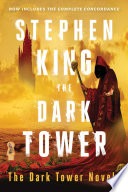It is hard to summarize a reading experience that took decades to create. During my sophomore year in college, I read the first 3 books because at some point, probably around the time of the release of the miniseries, The Stand, I decided to give Stephen King a chance and read his books. I learned a valuable lesson after that: never knowingly read a series of books until you know that the series is over otherwise you will not remember what happened in the earlier books or the author could die before finishing it and you will never know how things turned out.
I waited until long after King finished The Dark Tower Series before rereading the first three books and reading the remaining four. Overall the story was a captivating one, but by perhaps Book VI and definitely Book VII, I could see the seams loosen, which I attribute to King’s almost fatal injury making a book that was once a metaphorical analysis on love versus duty/addiction more obviously autobiographical as it progressed.
Individually each work poses its own merits and faults so I will discuss each one briefly as well as I can remember.
The first book, The Gunslinger, is the shortest one of the lot and establishes that the reader is not in known territory, but a similar land with a definite supernatural bent. It is a bleak world without a lot of hope, but it is the most poetic of all the books; however, if there were no subsequent books, it could have stood alone and is the only one in the series that can do so. The central character, Roland, is a standalone figure that would make Clint Eastwood seem warm in comparison.
The second book, The Drawing of Three, is an amazingly strong book that unites 3 different times/worlds: the world of the first book, and the world of two different and familiar eras and has very strong characterizations as we get a solid introduction to the central characters of the saga as they overcome their various weaknesses.
The third book, The Wastelands, shows the central characters as they team up to become gunslingers, save Roland and another character from the first book from madness and death and continue in their quest to get to the Dark Tower. For me, this book really creates the epic feel as a struggle of good versus evil. The language and traditions of Gilead gave me the shivers, “I do not aim with my hand; he who aims with his hand has forgotten the face of his after. I aim with my eye. I do not kill with my gun; he who kills with his gun has forgotten the face of his father. I kill with my heart.” Even though this book can’t stand alone, it is the book that creates the momentum of desire for the reader to continue with this saga. Roland undergoes a seemingly massive character change and is not the cold, calculating death dealer that he appeared to be in the first book.
The majority of the fourth book, Wizard and Glass, is actually a prequel as Roland tells his team of friends about his early days as a gunslinger. Even though a part of me wondered why King didn’t just start the series with this story, because he was harkening back to a writing technique that he used in the first book instead of telling the story chronologically, I enjoyed it. Also for the first time, I noticed that King used elements from his non-Dark Tower books not in the series.
The fifth book, Wolves of the Calla, is the first and only book that doesn’t begin where the previous book left the gunslingers. It spends the majority of the first part focusing on a town in desperate need of the gunslingers and acts as a handy introduction of what it actually means to have no gunslingers and to now be able to fight back; thus strengthening the readers’ love of the central characters. King reintroduces a major character in one of his previous books, and I loved finding out what that person was up to since their time in our world.
The sixth book, Song of Susannah, may be the weakest book in the series because it is extremely self-conscious or painfully sensational in introducing a variety of villains with distinct features, but the majority are essentially interchangeable and banal in their focus. His references become more heavy handed and the language less seemingly effortless.
The seventh and final book, The Dark Tower, starts with the same flaws that hurt Song of Susannah. A lot of running from various interchangeable bad guys and trying to get on track. A good editor should have cut the first 196 pages to a couple of good chapters. Afterwards, the book picks up its usual momentum as the team begins to fulfill their quest.
The actual ending leads to some questions. If Roland chose love over his quest, sure he would be happy, but wouldn’t the world still be destroyed? I think that ultimately after King’s life threatening injury, his regret and self-recrimination began to infect the series explicitly and get reflected in Roland; thus perhaps confusing what would have been a more traditional and satisfying book. Ultimately I think the majority of the story is more beautiful than not, and all flaws should be laid at the feet of the man driving the van.

The Dark Tower Series
Stay In The Know
Join my mailing list to get updates about recent reviews, upcoming speaking engagements, and film news.




